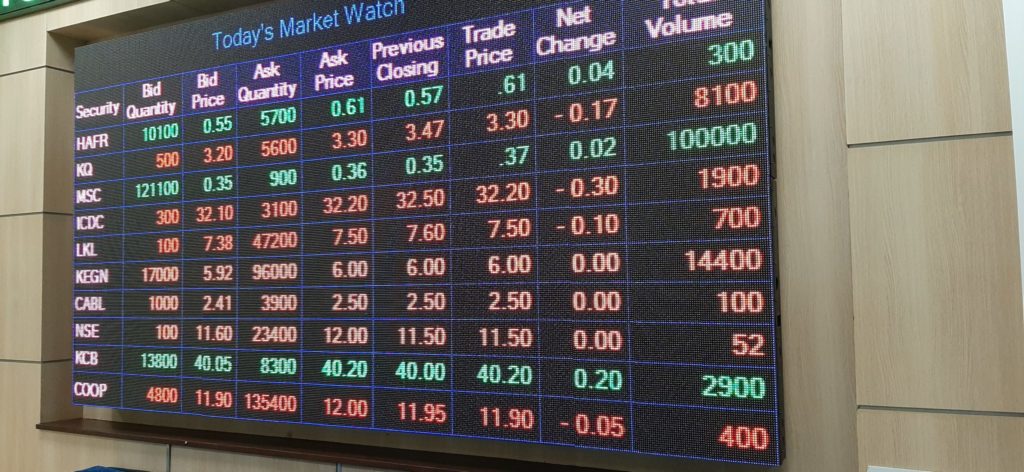A display of listed equities at the NSE. PHOTO | CITIZEN DIGITAL Re-imposed restrictions to contain the COVID-19 pandemic have served to reverse gains made by the performance of the stock market.
While the Nairobi Securities Exchange (NSE) was tipped to turn the corner in performance this year, the past week has served as a dampener to the resurgence prospects.
At the end of the first quarter of the year to March, NSE gains stood at 4.3 per cent for the all share index, 3.4 per cent for the NSE 25 index and negative 1.2 per cent for NSE 20.
The pick up was anchored on gains made by large cap companies such as BAT, KCB Group. Safaricom and Cooperative Bank whose margins were up by 31.6 per cent, 8.4, 5.8 and 5.6 per cent respectively.
The past week has nevertheless restored volatility for the stock market with all three indexes shedding 3.5, 2 and 2.9 per cent of their values respectively.
This to follow dwindling interests in stocks by investors following the re-introduction of tough containment measures by government on March 26.
Co-operative Bank, EABL and Equity have felt the burn of the new slump with their stock prices shedding 12.1, 5.8 and 4.8 per cent of their values respectively in the last week of trading.
On their part, foreign investors participation has remained lackluster, posting a year to date (YTD) performance of Ksh.970.1 million ($8.9 million) in net sell offs over the first quarter. In the last week alone, foreign investors dumped stocks equivalent to Ksh.991.9 million ($9.1 million).
The NSE is looking to escape another bear run year after suffering the pandemic effects of the COVID-19 pandemic last year.
NSE primary indices — the Nairobi All Share Index (NASI), NSE 20 and NSE 25 — shed 8.6, 16.7 and 29.6 per cent of their values in 2020 with foreign investors offloading nearly Ksh.31 billion from the exchange in the 12 months.
The NSE nevertheless still trades at 6.7 per cent below the historical 12.9 times price to earnings ratio represents pockets of value to willing investors.Nevertheless the market is overvalued from a stand point of the all share price to earnings growth ratio (PEG) which sits at 1.4 times.Analysts at Cytonn Investment expect investors to favor holdings in companies with a higher growth potential.“With the market trading at a premium to its future earnings growth, despite the low valuations currently in the market, we believe that […]
